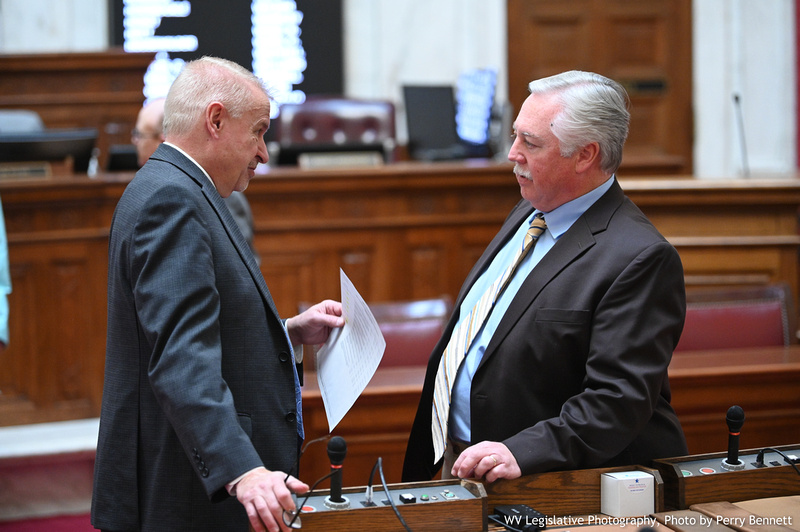Proposals to cut West Virginia’s personal income tax dominated last year’s regular legislative session, but no one could exactly agree on how to structure the cut.
House Finance Chairman Eric Householder, R-Berkeley, is giving the income tax cut another try. He is the lead sponsor of House Bill 4007, which would prompt an initial 10 percent cut for each bracket while also establishing a savings fund for possible future cuts.
That’s a bit different from what Gov. Jim Justice proposed last year, which was a more dramatic elimination of the personal income tax offset by proposed offsetting increases of other areas such as the sales tax. Delegates voted down that proposal near the end of last year’s regular legislative session.
The House income tax bill was formally introduced this past Thursday and may hit the House Finance Committee agenda on Monday. There is not yet a fiscal note to assess the cost.
Householder says his goal is to give West Virginians a break for Tax Freedom Day, which is the date when most people’s take home pay has accumulated enough to pay their federal and state taxes. All income after that is gravy.

“My idea is, we should be doing a pay raise for all workers,” Householder said in a telephone interview. “What better way to reinvest some of our surpluses? Right now we’re on target to have a $700 million surplus by the end of the fiscal year.
“What better way than to take those surpluses and reinvest them back to you the taxpayer because it’s your money. It’s your hard-earned money. You’ve worked for it for years. You’ve helped contribute to this surplus, and I think it’s a great opportunity to expand the prosperity for citizens in the state.”
The bill would lower each of West Virginia’s five tax brackets by 10 percent starting Jan. 1, 2023.
So the highest, 6.5 percent, would be reduced to 5.85 percent. The lowest, 3 percent, would be reduced to 2.7 percent.
The other aspect of the bill would establish a savings fund that could be used to cushion future cuts if legislators choose to make them.
The account, called the “Stabilization and Future Economic Reform Fund” — or SAFER — would draw money from any revenue surplus the state runs at the end of the fiscal year.
Right now, the state takes 50 percent of year-end surplus and pumps it back into the general fund. The other half goes to rainy day funds.
The current balance in West Virginia’s rainy day accounts is historically healthy, almost a billion dollars. As of June 30, the amount was $995 million, according to state figures.
So the bill would divert that year-end surplus from the rainy day funds and instead put the money into SAFER.
The bill does not institute triggers or call for additional, automatic income tax cuts — but if legislators in coming years want to pursue more income tax cuts then they could draw from that savings.
“They won’t become reduced again until a legislative action happens a second time. Each time you have to take legislative action,” Householder said. “You may go several years, you may go every year. I can’t predict what the Legislature may do.”

People assessing the bill should consider that each tax reduction would use one-time funds to pay for a permanent tax cut, said Kelly Allen, executive director of the West Virginia Center on Budget & Policy. The likely outcome would be future budget cuts, increases to other taxes, or both, she said.
“It also exploits the vulnerability of the governor’s administration having full control over revenue projections. Low-balled projections can ‘create’ surpluses as we’ve seen in recent months, causing state agencies and programs to be underfunded while accelerating tax cuts whether or not the state can afford them,” Allen said.
“As an example, DHHR’s budget hearing revealed that they have over 1,400 positions unfilled and a projected $171 million shortfall in FY 2024. An income tax cut would overwhelmingly benefit the state’s wealthiest residents at the same time state agencies are facing staffing crises and shortfalls that could put their missions at risk.”

The House’s incremental approach with no offsetting increases is fairly common among states right now, said Ryan Maness, director and counsel for tax policy at MultiState Associates, a government relations company.
“Looking broadly, there are several states, typically led by Republican governors, that are prioritizing personal income tax cuts this year. What we’ve seen is there has been a split about how to do it,” he said.
“One camp (and this is kind of what Justice did last year) is to take a big swing to cut deep into the PIT and replace those revenues with boosts to other taxes. The other option, and we’re seeing it in HB 4007, is to make smaller cuts that don’t need to rely on replacement revenue.”
Most states seem, like Householder, to favor the second option. Maness noted that Iowa Gov. Kim Reynolds favors a plan like this. Gov. Tate Reeves in Mississippi was offered a tax swap plan by a House bill, but seems to be favoring a more pared down Senate bill.
“So I think it’s notable that lawmakers are taking this approach, particularly after what happened with the West Virginia tax reform last year, since a big tax swap in an election year is a politically risky proposition,” Maness said.
He noted that he is not deeply familiar with West Virginia’s tax brackets, “but it is my general rule of thumb that the deeper and more immediate your tax cuts the more likely it is that you will at some point need to replace those revenues with higher taxes elsewhere.”

